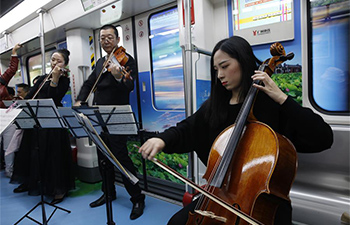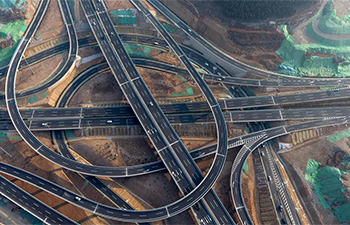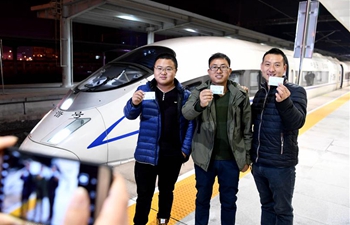
Xinhuanet holds a seminar on major global events in Beijing, capital of China, Dec. 26, 2017. (Xinhuanet/Guo Xiaotian)
by Zhou Xin
BEIJING, Dec. 28 (Xinhuanet) – Xinhuanet has held the 8th seminar on major global events recently in Beijing.
Themed "New Landscape for the World, New Era for China", the seminar gathered together 12 renowned scholars and experts on Tuesday.
The scholars and experts participated in three panel discussions, covering topics on the United States under the Trump administration, the prospect of European integration and the Middle East situation.
They also reviewed developments in China's diplomacy in the new era.
Where is the U.S. headed in the Trump era?
The political polarization of the United States in the Trump era is becoming more aggravated, said Ruan Zongze, executive vice president of China Institute of International Studies.
Ruan held that the Trump administration is bringing fundamental, long-term changes to the American society.
Qiao Liang, professor at the National Defense University of People's Liberation Army, said that Trump wants to restore America's real economy, which is a right idea adopted at a wrong time.
Moreover, he added, America's economic woe nowadays can be attributed to the over promoting of virtual economy.
Is European integration possible under the shadow of populism?
Populism is a special phenomenon derived from the European democratic system, Tian Dewen, deputy director of Bureau of International Cooperation of Chinese Academy of Social Sciences, noted.
It leads to the rise of protectionism in Europe and will hinder European integration, and eventually speed up the decline of the continent, Tian continued.
Chen Zhirui, professor at China Foreign Affairs University, believed that populism is not necessarily a bad idea.
If political parties in Europe can tolerate and absorb the rational political views of populists, integrate and optimize the power of the general public, they will seize the opportunity to revive Europe, he said.
Will more proxy wars erupt in the Middle East?
The stability of the Middle East requires internal and external balance, said Li Shaoxian, director of China-Arab Research Institute at Ningxia University.
Li pointed out that the old regional landscape has collapsed and a new one is yet to be established, which leaves a gap for instability and potential danger.
Yin Gang, researcher at Institute of West-Asian and African Studies of Chinese Academy of Social Sciences, said that the Arab countries are creating a balance of power with Iran, which will facilitate peace in the region and avoid more proxy wars.
China's diplomacy in the new era
After heated panel discussions, six scholars gave speeches on China's diplomacy.
Su Ge, director of China Institute of International Studies, said that while facing major changes in the international landscape, building a community of shared future for mankind charts the course for China's major-country diplomacy in the new era, which provides China's solution for global governance.
Prominent problems in Western nations, such as anti-globalization, fragmentation and radicalization, pose challenges to China's diplomacy, said Jin Canrong, vice president of the School of International Studies at Renmin University of China.
Gao Zugui, deputy director of Institute for International Strategic Studies of Party School of CPC Central Committee, said that China has gradually formed a new framework for its major-country diplomacy in recent years.
Cui Hongjian, director of European Studies at China Institute of International Studies, held that China should grasp the principle of balance in its foreign policy on Europe and assist Europe in becoming a positive force in the multi-polarization process of the world.
Zhang Huanli, former Tokyo correspondent of Xinhua News Agency, is optimistic about the improvement of China-Japan relations in 2018.
However, it will only happen with concrete actions to be taken by Japanese Prime Minister Shinzo Abe, Zhang added.
Chen Fengying, researcher at China Institutes of Contemporary International Relations, said that China and the world have both entered a new era, when the major contradiction facing the world economy is one between the emerging markets' as well as the developing countries' demand for voices and influence in global economic governance and the inadequate, lopsided Bretton Woods system.
China should correctly choose a strategy of foreign economic relations according to the changing of times, Chen concluded.
The annual event has become a high-standard platform for vibrant, in-depth discussions among scholars and experts of international relations on global issues held by Xinhuanet.















